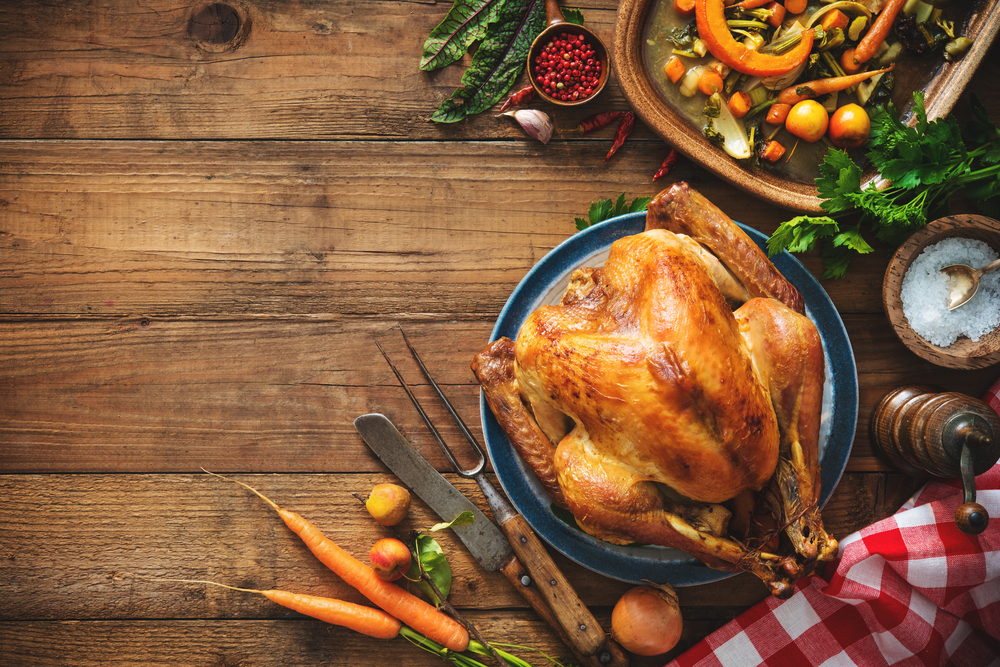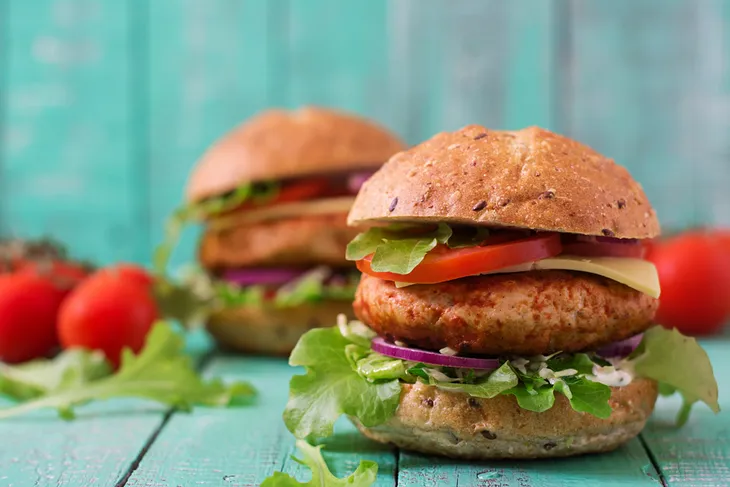Turkey is the highlight of many fall feasts, with Thanksgiving being the prevailing event associated with turkey. Paired with gravy, sweet potatoes, mashed potatoes, and cranberries, you have one of the most quintessential fall meals. But when you sit down for your turkey dinner, you might begin to wonder, is turkey healthy? Turkey contains several nutrients, like protein and B vitamins. But just like every food, there are downsides to it as well.
The Health Benefits of Turkey
Turkey is a wonderful source of protein. This nutrient is essential in muscle development and cell health. When compared to red meat, turkey offers similar protein levels with less fat, making it a great choice for most people.
“Additionally, a high-protein diet may even support weight loss by promoting feelings of fullness. Just 2 thick slices (84 grams) of turkey pack 24 grams of protein — an impressive 48% of the DV,” reports Healthline.
A Great Source of Vitamins and Minerals
In addition to its protein benefits, turkey is loaded with B vitamins and minerals. “Two thick slices (84 grams) of turkey pack 61% of the DV for vitamin B3, 49% for vitamin B6, and 29% for vitamin B12,” continues the source.
On top of all those B vitamins, you’ll also get plenty of selenium, zinc, and phosphorus minerals.
Turkey’s Nutrient Profile
The U.S. Department of Agriculture has listed the nutrient profile for 3-ounces of roast turkey breast:
- 125-calories
- 25.6-grams of protein
- 1.77-grams of fat
- 0-grams of carbohydrates
The white meat of turkey is the lowest in calories and fat. However, it contains fewer minerals and vitamins than is found in dark meat. Knowing all this, you can make a better decision on which type of turkey meat you eat. For example, some people need to watch their calorie intake making white turkey meat the better option. Whereas, those who need to increase their calorie intake, vitamins, and minerals should focus on eating dark meat.
Control Diabetes
People who have diabetes need to be cautious of the glycemic index of their food. The glycemic index is a measure that indicates how quickly a food causes your blood sugar to rise. Luckily, the glycemic index of turkey is low, meaning that it won’t cause you to have a significant blood sugar spike like a high carb, high sugar food would.
Adding turkey to your diet is a healthy way to manage your sugar levels. If you start your meal off with turkey you’ll fill up with protein before you overeat on sugary foods, further working to keep your blood sugar levels under control.
Improve Heart Health
Your heart health is dependent upon several components working together at optimum levels. This includes proper blood pressure, adequate hydration, and low cholesterol levels. “Low GI foods like turkey can also help increase levels of good HDL cholesterol in your body. HDL cholesterol travels through the bloodstream and helps to remove bad LDL cholesterol,” says WebMD.
When you have high levels of LDL it can damage your arterial walls increasing your risk of heart disease. Adding turkey to your diet can help you work towards better heart health by increasing the HDL to reduce the likelihood of heart disease. Make sure to choose turkey without the skin to keep fat content low.
Brain Health
There is a lot of talk these days about the increase in Alzheimer’s disease and dementia. While turkey is not the solution to the problem, it may carry a small piece to the puzzle. The MIND diet (Mediterranean-DASH intervention for neurodegenerative delay) is a way of eating that is similar to the Mediterranean diet. The MIND diet works to help reduce the risk of developing dementia. Part of this diet is turkey.
According to WebMD, “by eating poultry products like turkey at least twice a week as part of the MIND diet, older adults may preserve their memory and thinking skills.” Incorporate plenty of fresh fruits, vegetables, nuts, and fish to round out your diet.
Cancer Fighter
There is some evidence that suggests consuming a diet high in the mineral selenium can protect against certain types of cancer. WebMD identifies selenium as being protective against bladder cancer, stomach cancer, lung cancer, and breast cancer. Turkey is a great source of selenium, therefore potentially able to help you prevent those kinds of cancer.
The source continues to say that the protective effects of selenium are only seen when you eat it in your food and not when you take selenium supplements. More research needs to be done on this topic but the information is helpful to know for those who are looking for cancer protection.
Adding Turkey To Your Diet
Turkey doesn’t have to be only for dinner as a whole roast bird! There are so many different ways to add turkey to your diet. For breakfast, you can have turkey sausage with eggs and roasted vegetables. Lunchtime can include a turkey sandwich. With so many red meat substitutes made with turkey, like ground turkey meat and turkey burgers, your options for dinner are almost limitless.
Always pay attention to the type of turkey you are eating to ensure it is the healthiest form of meat. You’ll want to stay away from added oils, fats, and sodium that can turn your healthy meal into anything but that. We suggest extra lean ground turkey and freshly sliced roasted turkey.
Types of Turkey To Avoid
Turkey can be processed in ways that add sodium and other additives making it a less than a healthy choice. According to Medical News Today processed turkey and other meats, “are linked to the development of cancer. The risks of obesity, heart disease, high blood pressure, high cholesterol, cancer, and infertility increase with the level of meat intake.”
The source suggests avoiding processed turkey. Just like all foods, moderation is key. A healthy diet includes a wide variety of food and does not focus on a single item to get all the nutrients. Turkey can be a part of your diet but should not be the only source of protein, vitamins, and minerals.
Does Turkey Make You Tired?
We always hear how turkey contains tryptophan, an essential amino acid that “…is involved in the production of serotonin (a hormone that helps regulate mood) and melatonin (a hormone that helps regulate your sleep cycle)” as reported by Healthline. But are a few slices of turkey actually going to make you sleepy? It turns out that it won’t. The amount of tryptophan in a serving of turkey is not nearly enough to cause tiredness.
So if the turkey doesn’t make you tired then why can’t we keep our eyes open after a large Thanksgiving dinner? You are probably tired because you’ve eaten a large meal full of carbohydrates that causes your blood sugar to spike and then fall. On top of that, drinking alcohol with your meal will cause sleepiness too.
Who Shouldn’t Eat Turkey?
There isn’t one specific reason for anyone not to eat turkey. People who are vegetarians or vegans will choose to stay away from meat like turkey. But if you have health conditions, there isn’t a reason to avoid turkey. If you need to keep your fat intake to a minimum we suggest staying away from the dark meat and the turkey skin.
As we’ve mentioned before, turkey can be healthy for just about everyone. It just needs to be eaten in moderation and should not be your primary source of any vitamin or nutrient.
Healthy Ways To Eat Turkey
Now that you’ve learned how turkey can be healthy, it’s time to find the best ways to eat it. Consuming roasted turkey without adding salt will be one of the best ways. It is not processed and can be used in several ways, like sandwiches, salads, or just plain on its own.
Finding new ways to mix your turkey with other ingredients can change the flavor and keep you interested. Instead of ground beef tacos, use shredded turkey mixed with taco seasoning. Or add turkey to your favorite salad to bring in extra protein and flavor.















